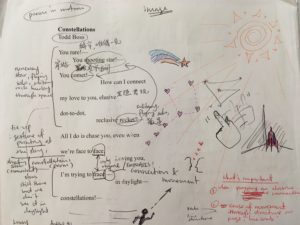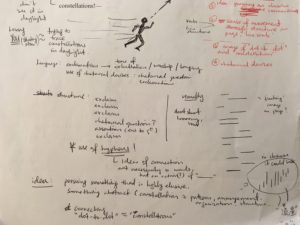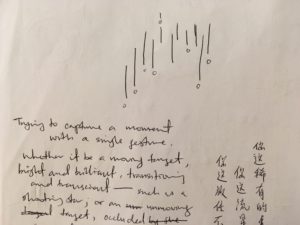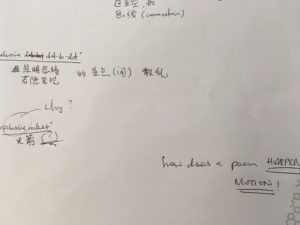Lian Hai Guang is currently a postgraduate at Nanyang Technological University’s (NTU) Master’s of Translation and Interpretation (MTI) Program, located in Singapore. He can be reached at lianhaiguang@gmail.com. His translation of Todd Boss’s ‘Constellations’ appeared at Alluvium on 22nd May 2017.
Todd Boss attends to how a poem happens. Hence, Motionpoems emphasise movement and kinaesthetic action. His work is also about facilitating meaningful encounters with art[1]. “Constellations” is no exception.
An emphatic voice gives chase to an elusive and energetic star, but only manages to catch a glimpse of it. An apostrophe, short but forceful.
The poem attempts to capture a sublime encounter with a single gesture, somewhere between the impermanence of a shooting star and the constancy of a constellation. An encounter so elusive and fleeting, we can only gesticulate about with language.
To translate this poem on its terms is to appreciate its inherently performative nature—a mimesis demonstrating the temporal nature of an aesthetic encounter. Something that can only be performed, but not fixed, with words. Something impossible without an intimate reading.
An adequate translator is foremost an adequate reader. Reading is more than just understanding the signification of words, but also how they dance and contribute to a dynamic whole. Imagery, form, rhythm and rhyme. These are some of the poetic elements that require breaking down and reconstruction in the target language. Reconstruction because there is no natural or necessary equivalence between languages and their respective cultures. Translation is reading is rewriting.
The original has a lot of style. We have on page, a river of words gushing with too much force. A voice breaks the surface, now and then, when it can; the tone imploring, and desperate. Words are ejaculated, spat in passion. These exclamations are followed by long dashes of silence—as the voice succumbs to the drag of undercurrent emotions precariously balanced between ecstasy and hysteria. The lines of the poem look like an afterimage, a blur of motion. Just like an encounter with the ephemeral.
The river of words flows east, and arrives at a place where they can drop vertically down. In Chinese, words can cascade and fall. Much like stars. They are also complete and whole on their own, not just an assembly of letters. They now hang better in the sky; this being one of the low-hanging fruits. I hang the words up like stars, and build a constellation. Joining them dot-to-dot, I trace their intractable paths in this alternate linguistic universe, probing for my reclusive rocket.
Reclusive rocket. How does one ignore the sweet sounds of alliteration? I took the bait. More than just a falling star, I add the sense of a lone ranger travelling through endless space. Alone. Aloof. I allow some words to break out from the safety of the constellation, with one that ends up alone. Empty. Drawing nothing.
I ask myself if this is too much, but decide no. After all, Boss writes for the displaced[2].




_____
[1] Boss, T. (2016). Retrieved May 12, 2017, from https://toddbosspoet.com/about/
[2] Boss, T. (2009). Retrieved May 12, 2017, from http://howapoemhappens.blogspot.sg/2009/10/todd-boss.html
